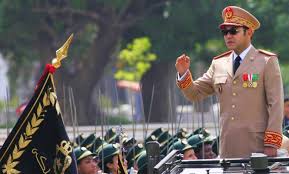
Malaysia Urges Extension of Myanmar Ceasefire as ASEAN Maintains Ban on Coup Leaders

 :
| Updated On: 26-May-2025 @ 12:46 pm
:
| Updated On: 26-May-2025 @ 12:46 pmSHARE
Malaysia has called for the extension and expansion of the post-earthquake ceasefire in Myanmar, which is due to expire by the end of May, amid ongoing fighting that questions the ceasefire’s effectiveness. Malaysian Foreign Minister Mohamad Hasan made the appeal during an ASEAN foreign ministers meeting in Kuala Lumpur, just a day before the ASEAN leaders’ summit. Since Myanmar’s military coup in February 2021 that ousted civilian leader Aung San Suu Kyi, ASEAN’s diplomatic efforts to resolve the conflict have largely been unsuccessful. The failure of Myanmar to implement a five-point peace deal agreed upon in April 2021 led ASEAN to exclude coup leaders from its annual meetings.
Mohamad urged all stakeholders in Myanmar to cease hostilities and expand the ceasefire beyond the currently affected zones to support recovery and ease the suffering of Myanmar’s people. Malaysia currently holds the rotating chairmanship of ASEAN and has emphasized the need for stronger regional efforts as Myanmar’s crisis has spilled over borders. Refugees continue to flee into neighboring ASEAN countries, and cross-border crime has increased.
Malaysia’s focus is on reducing violence and improving humanitarian aid access, but Mohamad highlighted the difficulties in initiating political dialogue between conflicting parties due to a “trust deficit.” The military government led by Senior General Min Aung Hlaing had initially declared a truce following a devastating earthquake in late March that killed nearly 3,800 people and left tens of thousands homeless. Though the ceasefire has been extended before, conflict monitors report that fighting, including military airstrikes, has continued.
In April, Malaysian Prime Minister Anwar Ibrahim met with Min Aung Hlaing in Bangkok, urging him to respect the truce. Anwar stated that ASEAN expressed concern and sought to slowly build consensus to ensure “fair and free elections,” though analysts have doubted the feasibility of such elections under current conditions. ASEAN’s longstanding policy of noninterference in member states’ domestic affairs has limited its capacity to resolve Myanmar’s conflict effectively.
The United Nations and independent monitors report ongoing deadly aerial bombardments by the military government despite the armistice. In mid-May, a military airstrike targeted a school near the earthquake’s epicenter in the Sagaing region, killing 22 people, including 20 children. Multiple anti-coup and ethnic armed groups have pledged to pause hostilities, but violence persists.
Some residents in eastern Myanmar have been displaced as anti-coup forces besiege military-controlled towns along a profitable trade route toward Thailand. Meanwhile, Myanmar’s military government plans to hold elections toward the end of the year. However, the opposition National Unity Government has urged the public and political parties to boycott any elections organized by the military junta, calling the process illegitimate.
Overall, Malaysia is pushing for an extended and broader ceasefire to facilitate recovery and peace efforts in Myanmar. Yet, ongoing violence, mistrust between parties, and political complexities continue to challenge prospects for a peaceful resolution. ASEAN remains concerned but constrained by its principles, while regional stability is threatened by spillover effects such as refugee flows and cross-border crime. The international community watches closely as Myanmar struggles with both natural disaster aftermath and a deepening political and humanitarian crisis.
Contact Us
House. No. : 163, Second Floor Haridev Rd, near Puberun Path, Hatigaon,Guwahati, Assam 781038.
E-mail : assaminkcontact@gmail.com
Contact : +91 8811887662
Enquiry
×
Reporter Login
×